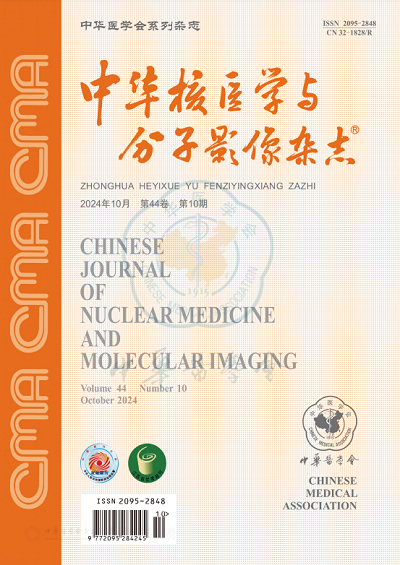一步法合成18F-PSMA-1007及其在前列腺癌中的PET/CT成像
引用次数: 2
摘要
目的合成并分析18f -前列腺特异性膜抗原(PSMA)-1007,探讨其在前列腺癌中的影像学表现。方法采用一步法,采用CFN-MPS-200自动合成模块合成18F-PSMA-1007,并对其进行质量分析。对一位66岁的前列腺癌患者进行了18F-PSMA-1007 PET/CT成像。结果18F-PSMA-1007的合成时间约为50 min,放射化学产率为(25.0±5.0)%(衰减校正,n=3)。放射化学纯度在99.0%以上,6 h后达到98.0%以上。产物为无色透明溶液,pH值为7.0 ~ 7.5,比活性为(410.0±11.0)MBq/ml,放射性核纯度在99.0%以上。患者PET/CT成像显示18F-PSMA-1007在前列腺癌中高度集中,最大标准化摄取值(SUVmax)为40.9。结论基于CFN-MPS-200多功能合成模块,可稳定合成18F-PSMA-1007,放化产率高,可在前列腺癌中富集。关键词:前列腺肿瘤;前列腺特异性膜抗原;氟放射性同位素;化学合成;正电子发射断层扫描;x线计算机断层扫描本文章由计算机程序翻译,如有差异,请以英文原文为准。
Synthesis of 18F-PSMA-1007 by one-step method and PET/CT imaging in prostate cancer
Objective
To synthesize and analyze 18F-prostate specific membrane antigen (PSMA)-1007, followed by its imaging in prostate cancer.
Methods
Based on one-step method, 18F-PSMA-1007 was produced by the CFN-MPS-200 automatic synthesis module and its quality analysis was conducted. 18F-PSMA-1007 PET/CT imaging was performed in a prostate cancer patient (66 years old).
Results
The synthesis time of 18F-PSMA-1007 was about 50 min, and the radiochemical yield was (25.0±5.0) % (attenuation correction, n=3). The radiochemical purity was above 99.0% and was above 98.0% after 6 h. The product was colorless transparent solution with pH value of 7.0-7.5, and the specific activity was (410.0±11.0) MBq/ml and the radioactive nuclear purity was above 99.0%. PET/CT imaging in the patient showed that 18F-PSMA-1007 was highly concentrated in prostate cancer with maximum standardized uptake value (SUVmax) of 40.9.
Conclusion
Based on CFN-MPS-200 multifunction synthesis module, 18F-PSMA-1007 can be stably synthesized with high radiochemical yield and can be concentrated in prostate cancer.
Key words:
Prostate neoplasms; Prostate-specific membrane antigen; Fluorine radioisotopes; Chemical synthesis; Positron-emission tomography; Tomography, X-ray computed
求助全文
通过发布文献求助,成功后即可免费获取论文全文。
去求助
来源期刊

中华核医学与分子影像杂志
核医学,分子影像
自引率
0.00%
发文量
5088
期刊介绍:
Chinese Journal of Nuclear Medicine and Molecular Imaging (CJNMMI) was established in 1981, with the name of Chinese Journal of Nuclear Medicine, and renamed in 2012. As the specialized periodical in the domain of nuclear medicine in China, the aim of Chinese Journal of Nuclear Medicine and Molecular Imaging is to develop nuclear medicine sciences, push forward nuclear medicine education and basic construction, foster qualified personnel training and academic exchanges, and popularize related knowledge and raising public awareness.
Topics of interest for Chinese Journal of Nuclear Medicine and Molecular Imaging include:
-Research and commentary on nuclear medicine and molecular imaging with significant implications for disease diagnosis and treatment
-Investigative studies of heart, brain imaging and tumor positioning
-Perspectives and reviews on research topics that discuss the implications of findings from the basic science and clinical practice of nuclear medicine and molecular imaging
- Nuclear medicine education and personnel training
- Topics of interest for nuclear medicine and molecular imaging include subject coverage diseases such as cardiovascular diseases, cancer, Alzheimer’s disease, and Parkinson’s disease, and also radionuclide therapy, radiomics, molecular probes and related translational research.
 求助内容:
求助内容: 应助结果提醒方式:
应助结果提醒方式:


